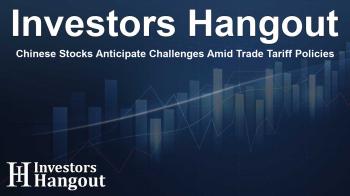Chinese Stocks Anticipate Challenges Amid Trade Tariff Policies

Chinese Stock Market Outlook Amid Tariff Concerns
As we move towards the New Year holiday, Chinese stocks find themselves in a precarious position, according to analysts at Morgan Stanley. Increased risk aversion and potential profit-taking could dominate market sentiment, particularly as trade tariff implications loom large.
Impact of Tariffs on Trade Dynamics
Recent statements from the U.S. government regarding trade policies have sparked concerns amongst investors. The uncertainty surrounding these tariffs, specifically a proposed 10% duty on all Chinese imports, could dampen trade relations and negatively impact Chinese exports.
Potential for Profit-Taking
Investors may opt to secure profits ahead of the holiday season, further leading to potential market instability. Morgan Stanley analysts anticipate that the inclination to reduce exposure to risk will increase as the New Year approaches, impacting market performance.
Expected Supply Chain Challenges
With ongoing discussions regarding trade deficits and a planned investigation into tariff impositions, significant obstacles may arise for supply chains. Analysts warn that a slowdown in Chinese exports is likely, particularly with tariffs hanging over the industry.
Market Performance Insights
Despite experiencing some losses recently, major indexes such as the Shanghai Shenzhen CSI 300 and the Shanghai Composite are still trading relatively flat as we enter the new year. However, conditions could deteriorate if tariff policies are implemented as proposed.
Future Earnings Projections
As 2024 approaches, many prominent Chinese corporations are set to release annual earnings that could further sway investor confidence. Morgan Stanley has highlighted the potential for downward revisions in these earnings, which could contribute to a turbulent market environment.
Conclusion: Navigating Uncertainty
Investors are advised to remain cautious as they navigate this period of uncertainty. With the looming threat of tariffs and potential earnings revisions, the Chinese stock market is poised for a challenging phase. Close attention to policy changes and market reactions will be essential for all stakeholders.
Frequently Asked Questions
What are the potential impacts of U.S. tariffs on Chinese stocks?
The anticipated U.S. tariffs could lead to reduced exports for China, causing overall weakness in the stock market.
How are Chinese investors reacting to potential profit-taking?
Investors may decide to take profits now to mitigate risks, especially before the holiday season.
What specific tariffs have been discussed by the U.S. government?
A proposed 10% tariff on all Chinese imports has been highlighted as a significant concern for investors.
Which Chinese stock indexes are currently monitored?
The Shanghai Shenzhen CSI 300 and Shanghai Composite indexes are key indicators being observed.
What should investors focus on in the near term?
Investors should pay close attention to upcoming earnings reports and any changes in trade policies that may arise.
About The Author
Contact Riley Hayes privately here. Or send an email with ATTN: Riley Hayes as the subject to contact@investorshangout.com.
About Investors Hangout
Investors Hangout is a leading online stock forum for financial discussion and learning, offering a wide range of free tools and resources. It draws in traders of all levels, who exchange market knowledge, investigate trading tactics, and keep an eye on industry developments in real time. Featuring financial articles, stock message boards, quotes, charts, company profiles, and live news updates. Through cooperative learning and a wealth of informational resources, it helps users from novices creating their first portfolios to experts honing their techniques. Join Investors Hangout today: https://investorshangout.com/
The content of this article is based on factual, publicly available information and does not represent legal, financial, or investment advice. Investors Hangout does not offer financial advice, and the author is not a licensed financial advisor. Consult a qualified advisor before making any financial or investment decisions based on this article. This article should not be considered advice to purchase, sell, or hold any securities or other investments. If any of the material provided here is inaccurate, please contact us for corrections.

